Unit 2 what should I do reading
八年级下册英语_Unit2_第二单元笔记+练习 (1)
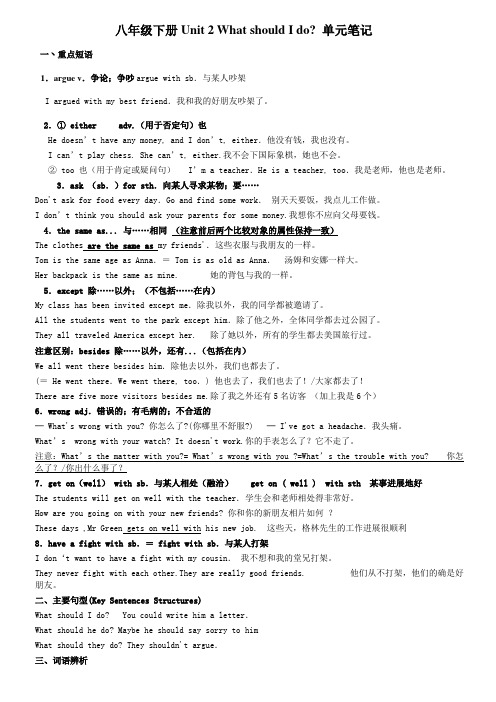
八年级下册Unit 2 What should I do? 单元笔记一丶重点短语1.argue v.争论;争吵argue with sb.与某人吵架I argued with my best friend.我和我的好朋友吵架了。
2.① either adv.(用于否定句)也He doesn’t have any money, and I don’t, either.他没有钱,我也没有。
I can’t play chess. She can’t, either.我不会下国际象棋,她也不会。
② too 也(用于肯定或疑问句)I’m a teacher.He is a teacher, too.我是老师,他也是老师。
3.ask (sb.)for sth.向某人寻求某物;要……Don't ask for food every day.Go and find some work.别天天要饭,找点儿工作做。
I don’t think you should ask your parents for some money.我想你不应向父母要钱。
4.the same as... 与……相同(注意前后两个比较对象的属性保持一致)The clothes are the same as my friends'.这些衣服与我朋友的一样。
Tom is the same age as Anna.= Tom is as old as Anna.汤姆和安娜一样大。
Her backpack is the same as mine. 她的背包与我的一样。
5.except 除……以外;(不包括……在内)My class has been invited except me.除我以外,我的同学都被邀请了。
All the students went to the park except him.除了他之外,全体同学都去过公园了。
新目标八年级下Unit 2 What should I do?难点聚焦

注意 : y e不 同于 ma e m y e 一个 副词 , y b mab y b 。 ab 是 ma e是情 态动词 m y) - a 3 动词原 形 b ,  ̄t e 意为 “ 许 ”后 接形 容词 、 或 , 名词 、 代词 等 。例 如 :
He ma h ma we r l o i o . y be t e n a e o k ng f r
. 入 ;i s l 髦 的 , 行韵 -ot。 t e不 时髦 的 , 时 的 .c1 s . p , 进 n t 时 y 流 u fs l y 过 al b
外 ;fi失败 ;rtr al eun归还 ;ic d n l e包括 ;p s u uh推 动 ;a ut 年人 d l成
2 。Ma b o h u d c I h m u . y e y u s o l a l i p
1 a b 是 副词 , )m y e 用来 表示 推测 , 意为 “ 也许 , 或许 , 大概 ” 。例如 :
ab o y y e u
are
y w Ⅲ
一
w .
~
躯
注 意 :e ( t n u h t o有 ( b n ) o g o d o …e 没有 ) 够 的 …… 去做 , 足 这时 可 以 同 S.ta…或 t …t…结 构 O.ht . o o o
il s r i g … .
=
Th g r s O o ng ha he a t o t c o 1 e il i S y u t t s c n’ g o s h o .
议 、要求 、可 能和意 愿等 。情态 动词没 6 人称 和数 的变化 。常 用 的情态 动词 有 :a , cud m y - c n o l, a, m g t ut sal h ud i,w ud 其 他 的还有 o g tt,n e ,dr 。本单 元 主要 学 习 c ud ih,m s h l o l,wl ol ; , ,s l u h o ed ae等 ol
Unit 2 What should I do重点知识解析归纳

Unit 2 What should I do? 重点词组归纳及语言要点解析重点词组归纳1. keep sb out (of the door ) 把某人拦在门外2. argue with sb (on sth)与某人争吵某事3.What’s wrong with ...? …怎么了/出什么事了?what’s the matter/trouble with... ?4.out of style 过时的5.in style 时髦的6. call sb up =phone/telephone sb. 打电话给某人7.call sb at +电话号码打电话8.to one’s surprise 令我惊奇的是9.be surprised at sth 吃惊于10. pay for sth 付钱11. get/be upset 不安/沮丧12.make sb upset 使某人不安13. as +adj/adv as possible 尽可能...14. under some pressure 在压力之下15. complain +that从句抱怨…complain about sth to sb=complain to sb about sth 向某人抱怨关于某事16.send sb sth =send sth to sb 送某物给某人pare sth with sb 把…跟…进行比较18.on the one hand…, on the other hand… 一方面......;另一方面......19.enough money 足够的钱20. ask for sth. 寻求/要......21. leave sth 落下某物22. tell sb to do sth 告诉某人做某事23. get alone well =get on well (with sb) 相处得好24.give sb some advice 给某人一些建议25.a piece of advice 一条建议26.fit into 融入…之中27.It’s time for sth. = It’s time to do sth . 该做某事的时候了28. not… until… 直到…才…29.It seems that从句=主语seems to do 似乎30.one/数词+ more sth 再要一个/多个某物语言要点解析1. borrow v. 借入I think you should borrow some money from your friends. (P12)我想你应该向朋友借钱。
Unit 2 What should I do
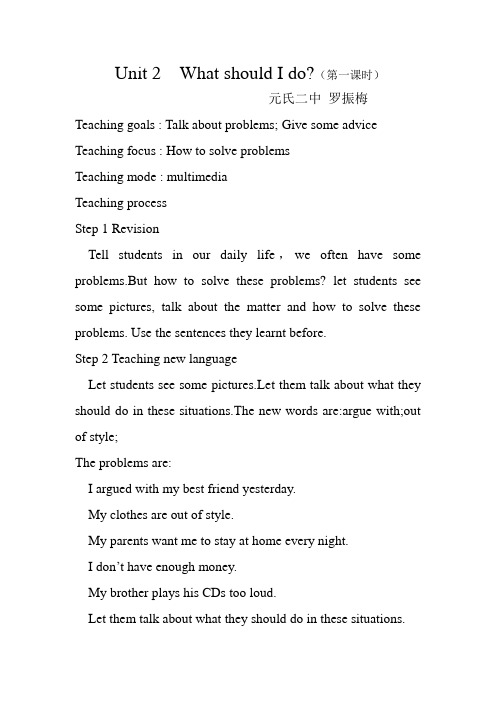
Unit 2 What should I do?(第一课时)元氏二中罗振梅Teaching goals : Talk about problems; Give some advice Teaching focus : How to solve problemsTeaching mode : multimediaTeaching processStep 1 RevisionTell students in our daily life,we often have some problems.But how to solve these problems? let students see some pictures, talk about the matter and how to solve these problems. Use the sentences they learnt before.Step 2 Teaching new languageLet students see some pictures.Let them talk about what they should do in these situations.The new words are:argue with;out of style;The problems are:I argued with my best friend yesterday.My clothes are out of style.My parents want me to stay at home every night.I don’t have enough money.My brother plays his CDs too loud.Let them talk about what they should do in these situations.Let them use You should…You could…to solve these problems.The advice may be:You should say you’re sorry.You should buy some new clothes.You should talk with them about your problems.You could get a part-time job.You should talk to him about your problem.Step 3 listening practiceRead the instructions to the class.Say,Listen to the tape circle the problems that tou hear the girls talking about.Check the answers.The following problems should be circle:My parents want me to stay at home every night.My brother plays his CDs too loud.I don’t have enough money.My clothes are out of style.Let students read the listening material together.Ask a student what the girl’s problems are.Step 4 Speaking practiceThis activity provides guided oral ing the target language.Let students practice this dialogue.They can practice like this:A: You look unhappy, what’s the matter with you?B: …what should I do?A: Maybe you should…/you could…B: Good idea.Make conversations like this. Tell students give more advice as much as possible.Step 5 Writing practiceLet students translate a Chinese article into English.The Chinese article is:这几天,我不高兴。
英语:Unit_2_What_should_I_do知识点训练课件(人教新目标八年级下)
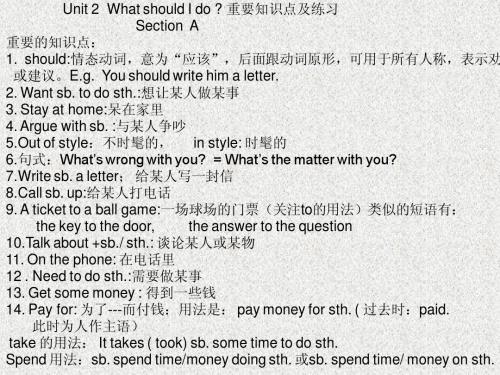
7.—I think you should go to bed early every day. A. Thank you for helping. C B. Of course. C. It doesn’t matter. D .That’s a good idea. 8.”_______” “I argued with my best friend.” A. How are you? B B. What’s wrong? C. Can I help you? D .Good morning! 三.句型转换: 1 .Could you ask him to give me a call, please? (改写同义句) Could you ask him to _____ _____ ______, please? call me up 2 .Dave had a headache last night.(对划线部分题问) _____ _____ _____ _____ with Dave? What the matter with 3. You should buy some new clothes. What should do _____ _____ I _______? 4. He should ask their parents for some money.(否定句) shouldn’t ask any He ________ _____ their parents for ______money. 5. The room is too small to hold so many people.(同义句) big enough The room isn’t ______ ______ to hold so many people. 6. His father bought him a new computer.(同义句) His father bought a new computer _____ him. ______ for 7.Tom spent 20 yuan on a book last Sunday.(同义句) paid for Tom _____ 20 yuan _____ a book last Sunday. 8.The box is too heavy for me to carry.(同义句) The box isn’t light enoughfor me to carry. _____ _____ 9. Anna paid 200 yuan for the new jacket.(同义句) Anna spent yuan _____ the new jacket. ______ on
Unit_2_What_should_I_do_Section_B_2

Read this letter. Underline the problem.
Dear Mary, I have a problem, and I need you help. I always thought I was popular at school. But I just found out that my friends were planning a birthday party for my best friend, and they didn’t invite me. Everyone else in my class was invited except me, and I don’t know why. I can’t think what I did wrong. I’m very upset and don’t know what to do. What do 我非常困惑不知道我怎么做。 you think? Can you help me? 我们班除了我之外所有 Yours, 的人都被邀请了。 Lonely Kid
根据首字母和句子意思填空。 olorful 1. The sweater is c____________. It looks beautiful. 2. The book is only 10yuan. It’s nexpensive i____________. 3. I hope my friends’ clothes are different riginal from mine. I want to be o____________. 4. Your hair is too long. I think you need a aircut h________. 5. There will be an English exam tomorrow. I pset feel u______ and I can’t sleep.
Reading

On the other hand… time and freedom
used to give another opinion that should be considered as well as the one you have just given
And …
time to do things by themselves
Dr Alice Green agrees. She also says that these children may find it hard to think for themselves when they are older. "Parents are trying to plan their kids' lives for them. When these kids are adults, they might find adult [c] : it difficult to plan things for themselves." 这些孩子们就会发现当他们长大后要自己 思考问题是多么困难的事. 思考问题是多么困难的事
Parents push their children a lot more. What Linda Miller tells us about children's pressure.
Section 2 While You Read
Life for Cathy Taylor's three children is very busy. Their school days are busy enough. After school, though, Cathy takes the two boys from football to basketball. Then she has to take her daughter to piano lessons. The tired children don't get home until 7 pm. They have a quick supper, and it's time for homework. 生活对于Cathy Taylor的三个孩子来说是 生活对于 的三个孩子来说是 非常忙碌的. 非常忙碌的 这些疲倦的孩子们要到晚上7点才得到家 点才得到家. 这些疲倦的孩子们要到晚上 点才得到家
八年级英语下册-unit2-What-should-I-do整单元课件-人教新目标版
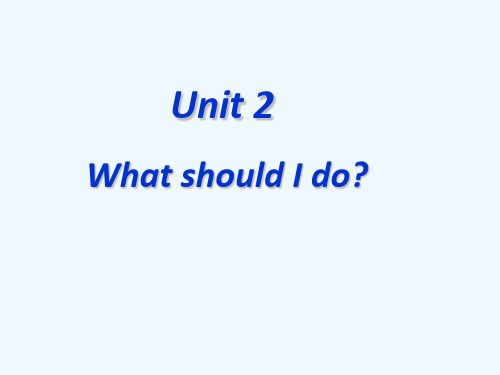
argued with
What's wrong? What should she do?
What's wrong? What’s the matter? What should she do?
...plays his CDs too loud
A: What's wrong? B: My clothes are out of style. A: Maybe you should buy some
Everybody has his or her problems.
I have mine. What's it? My mom plays music too loud. I can't stand it at all. What should I do? You should...
play v.播放
2a Listen. Peter's friend is giving him advice. Circle the word "could" or "should".
____________________
give him a call ______________ phone him
__________________________
2b Listen again.
Why doesn’t Peter like his friend’s advice?
Draw lines to match the advice with the reasons.
Advice
1. You could write him a letter. 2. Maybe you should call him up. 3. You should say you’re sorry. 4. Maybe you could go to his house. 5. You could give him a ticket to a ball game.
八年级英语下册Unit 2 What should I do- 知识讲解

八年级英语下册Unit 2 What should Ido? 知识讲解Unit2whatshouldIdo?【单元目标】1.单词与短语stereo,loud,argue,original,serious,style,wrong,argu ment,either,teen,talk,family,tutor,haircut,caller,e xcept,upset.wantsb.todosth. 2.playone’sstereo 3 stayathome4.arguewithsb/haveanargumentwithsb.5.beoutofstyle6.writesbaletter/writeto7.talkabout8.onthephone9.surprisesb.10.payfor 11.getapart-timejob 12.borrowsth.fromsb.13.asksb.for…14. haveabakesale 15.findout16.beupset17. call…up 18.thesameas9. getonwellwithsb.20. returnsth.21.haveafightwithsb.22.from…to…23. dropoff 24.preparefor25.after-schoolclubs26.beusedto27.fillup 28.takethemiddleroad2.目标句型:.whatshouldIdo?2.whydon’tyou…?3.youcould…4.youshould…5.youshouldn’t…3.语法情态动词的用法Ⅰ【重难点分析】情态动词Ⅰ*情态动词也可称为“情态助动词”,因为它和基本助动词都属于助动词类。
*情态动词和其他动词连用,可表示说话人的语气。
*情态动词可表达建议、要求、可能和意愿等。
*情态动词没有人称和数的变化。
*常用的情态动词有:can,could,may,might,must,shall,should,will,would这九大情态动词;其他的还有oughtto,need,dare等。
Unit 2 What should I do
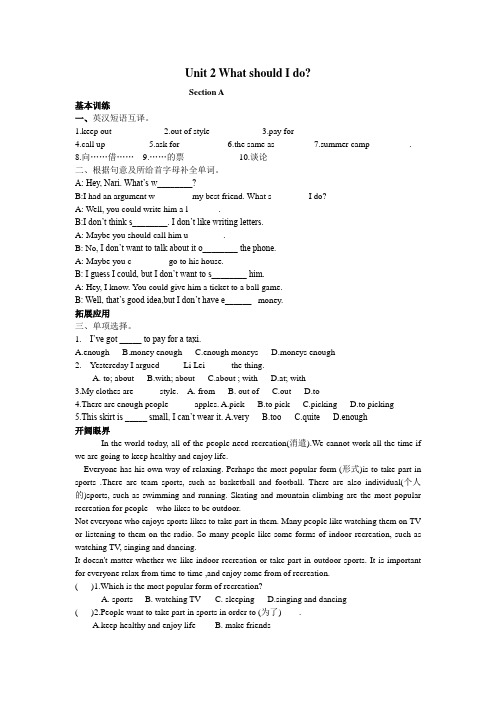
Unit 2 What should I do?Section A基本训练一、英汉短语互译。
1.keep out__________2.out of style__________3.pay for__________4.call up________5.ask for_________6.the same as_________7.summer camp_________.8.向……借……9.……的票____________ 10.谈论_________二、根据句意及所给首字母补全单词。
A: Hey, Nari. What‟s w________?B:I had an argument w________ my best friend. What s________ I do?A: Well, you could write him a l_______.B:I don‟t think s________. I don‟t like writing letters.A: Maybe you should call him u________.B: No, I don‟t want to talk about it o________ the phone.A: Maybe you c________ go to his house.B: I guess I could, but I don‟t want to s________ him.A: Hey, I know. You could give him a ticket to a ball game.B: Well, that‟s good idea,but I don‟t have e_______ money.拓展应用三、单项选择。
1.I‟ve got _____ to pay for a taxi.A.enoughB.money enoughC.enough moneysD.moneys enough2.Yestereday I argued _____Li Lei _____ the thing.A. to; aboutB.with; aboutC.about ; withD.at; with3.My clothes are _____ style. A. from B. out of C.out D.to4.There are enough people _____ apples. A.pick B.to pick C.picking D.to picking5.This skirt is _____ small, I can‟t wear it. A.very B.too C.quite D.enough开阔眼界In the world today, all of the people need recreation(消遣).We cannot work all the time if we are going to keep healthy and enjoy life.Everyone has his own way of relaxing. Perhaps the most popular form (形式)is to take part in sports .There are team sports, such as basketball and football. There are also individual(个人的)sports, such as swimming and running. Skating and mountain climbing are the most popular recreation for people who likes to be outdoor.Not everyone who enjoys sports likes to take part in them. Many people like watching them on TV or listening to them on the radio. So many people like some forms of indoor recreation, such as watching TV, singing and dancing.It doesn't matter whether we like indoor recreation or take part in outdoor sports. It is important for everyone relax from time to time ,and enjoy some from of recreation.( )1.Which is the most popular form of recreation?A. sportsB. watching TVC. sleepingD.singing and dancing( )2.People want to take part in sports in order to (为了)____.A.keep healthy and enjoy lifeB. make friendsC.find a good jobD. make mov e moneySection B基本训练一、词形变换。
八年级英语unit 2 what should i do人教版(新目标)知识精讲
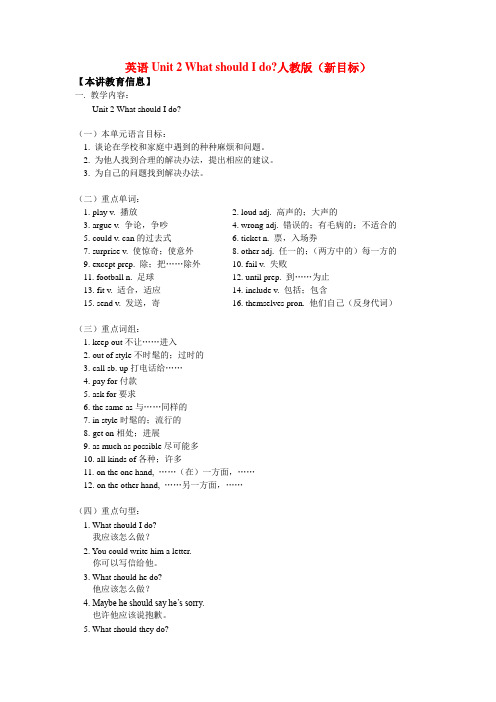
英语Unit 2 What should I do?人教版(新目标)【本讲教育信息】一. 教学内容:Unit 2 What should I do?(一)本单元语言目标:1. 谈论在学校和家庭中遇到的种种麻烦和问题。
2. 为他人找到合理的解决办法,提出相应的建议。
3. 为自己的问题找到解决办法。
(二)重点单词:1. play v. 播放2. loud adj. 高声的;大声的3. argue v. 争论,争吵4. wrong adj. 错误的;有毛病的;不适合的5. could v. can的过去式6. ticket n. 票,入场券7. surprise v. 使惊奇;使意外8. other adj. 任一的;(两方中的)每一方的9. except prep. 除;把……除外10. fail v. 失败11. football n. 足球12. until prep. 到……为止13. fit v. 适合,适应14. include v. 包括;包含15. send v. 发送,寄16. themselves pron. 他们自己(反身代词)(三)重点词组:1. keep out不让……进入2. out of style不时髦的;过时的3. call sb. up打电话给……4. pay for付款5. ask for要求6. the same as与……同样的7. in style时髦的;流行的8. get on相处;进展9. as much as possible尽可能多10. all kinds of各种;许多11. on the one hand, ……(在)一方面,……12. on the other hand, ……另一方面,……(四)重点句型:1. What should I do?我应该怎么做?2. You could write him a letter.你可以写信给他。
3. What should he do?他应该怎么做?4. Maybe he should say he’s sorry.也许他应该说抱歉。
人教版八年级下册英语第二单元unit2知识点

人教版八年级下册英语第二单元unit2知识点Unit 2 What should I do?一丶重点短语1.argue v.争论;争吵argue with sb.与某人吵架I argued with my best XXX.我和我的好朋友吵架了。
2.① XXX.(用于否定句)也He doesn’t have any money。
and I don’t。
either.他没有钱,我也没有。
I can’t play chess。
She can’t。
either.我不会下国际象棋,她也不会。
② too 也(用于肯定或疑问句)I’m XXX a XXX。
too.我是老师,他也是老师。
3.ask (sb.)for sth.向某人寻求某物;要……Don't ask for food every day.Go and find some work.别天天要饭,找点儿工作做。
I don’t think you should ask your parents for some money.我想你不应向父母要钱。
4.the same as。
与……相同(注意前后两个比较对象的属性保持一致)XXX same asmy friends'.这些衣服与我朋友的一样。
Tom is the same age as Anna.=Tom is as old as Anna.汤姆和XXX一样大。
Her backpack is the same as XXX.她的背包与我的一样。
5.except除……之外;(不包孕……在内)My class has been XXX.除我之外,我的同砚都被约请了。
All the students went to the park except him.除他之外,部分同砚都去过公园了。
XXX.除了她以外,所有的学生都去美国旅行过。
注意区别:besides除……以外,还有。
(包括在内)We all went there besides him.除他去以外,我们也都去了。
Unit 2.What should I do 知识要点
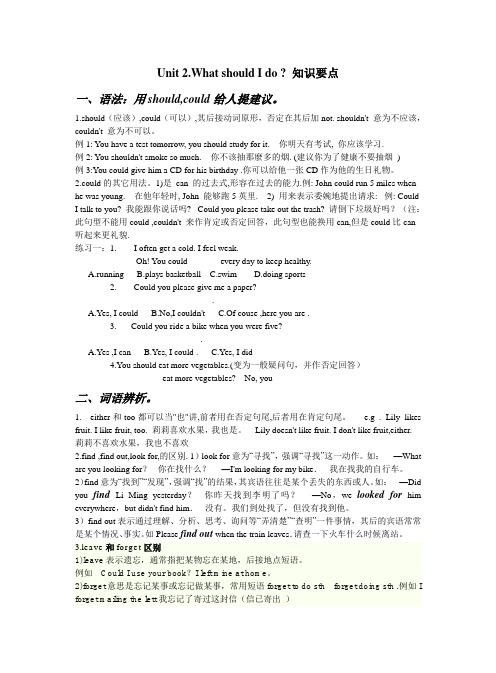
Unit 2.What should I do ? 知识要点一、语法:用should,could给人提建议。
1.should(应该),could(可以),其后接动词原形,否定在其后加not. shouldn't 意为不应该,couldn't 意为不可以。
例1: You have a test tomorrow, you should study for it. 你明天有考试, 你应该学习.例2: You shouldn't smoke so much. 你不该抽那麼多的烟. (建议你为了健康不要抽烟)例3:You could give him a CD for his birthday .你可以给他一张CD作为他的生日礼物。
2.could的其它用法。
1)是can 的过去式,形容在过去的能力.例: John could run 5 miles when he was young. 在他年轻时, John 能够跑5英里. 2) 用来表示委婉地提出请求: 例: Could I talk to you? 我能跟你说话吗? Could you please take out the trash? 请倒下垃圾好吗?(注:此句型不能用could ,couldn't 来作肯定或否定回答,此句型也能换用can,但是could比can听起来更礼貌.练习一:1.------I often get a cold. I feel weak.------Oh! You could _______every day to keep healthy.A.runningB.plays basketballC.swimD.doing sports2.------Could you please give me a paper?--------________________.A.Yes, I couldB.No,I couldn'tC.Of couse ,here you are .3.-----Could you ride a bike when you were five?-------______________.A.Yes ,I canB.Yes, I could .C.Yes, I did4.You should eat more vegetables.(变为一般疑问句,并作否定回答)________ ________ eat more vegetables? No, you __________二、词语辨析。
人教版八上unit 2 what should i do讲解
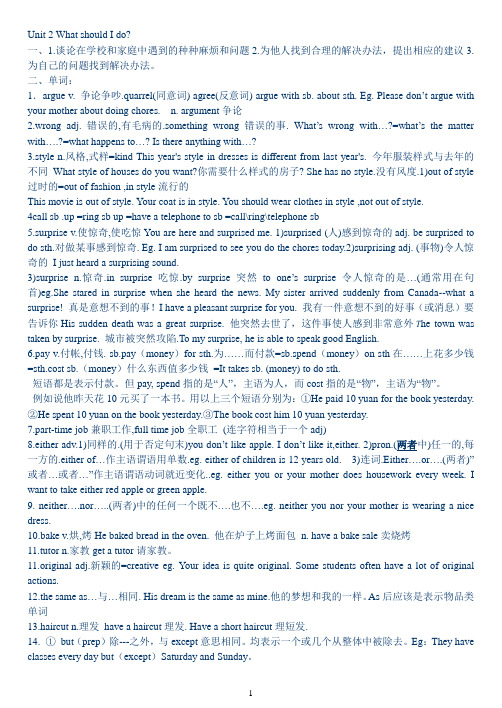
Unit 2 What should I do?一、1.谈论在学校和家庭中遇到的种种麻烦和问题2.为他人找到合理的解决办法,提出相应的建议3.为自己的问题找到解决办法。
二、单词:1.argue v. 争论争吵.quarrel(同意词) agree(反意词) argue with sb. about sth. Eg. Please don’t argue with your mother about doing chores. n. argument争论2.wrong adj. 错误的,有毛病的.something wrong错误的事. What’s wrong with…?=what’s the matter with….?=what happens to…? Is there anything with…?3.style n.风格,式样=kind This year's style in dresses is different from last year's. 今年服装样式与去年的不同What style of houses do you want?你需要什么样式的房子? She has no style.没有风度.1)out of style 过时的=out of fashion ,in style流行的This movie is out of style. Your coat is in style. You should wear clothes in style ,not out of style.4call sb .up =ring sb up =have a telephone to sb =call\ring\telephone sb5.surprise v.使惊奇,使吃惊You are here and surprised me. 1)surprised (人)感到惊奇的adj. be surprised to do sth.对做某事感到惊奇. Eg. I am surprised to see you do the chores today.2)surprising adj. (事物)令人惊奇的I just heard a surprising sound.3)surprise n.惊奇.in surprise 吃惊.by surprise 突然to one’s surprise令人惊奇的是…(通常用在句首)eg.She stared in surprise when she heard the news. My sister arrived suddenly from Canada--what a surprise! 真是意想不到的事!I have a pleasant surprise for you. 我有一件意想不到的好事(或消息)要告诉你His sudden death was a great surprise. 他突然去世了,这件事使人感到非常意外T he town was taken by surprise. 城市被突然攻陷.To my surprise, he is able to speak good English.6.pay v.付帐,付钱. sb.pay(money)for sth.为……而付款=sb.spend(money)on sth在……上花多少钱=sth.cost sb.(money)什么东西值多少钱=It takes sb. (money) to do sth.短语都是表示付款。
人教版新目标八年级下册英语教案:Unit2WhatshouldIdo?
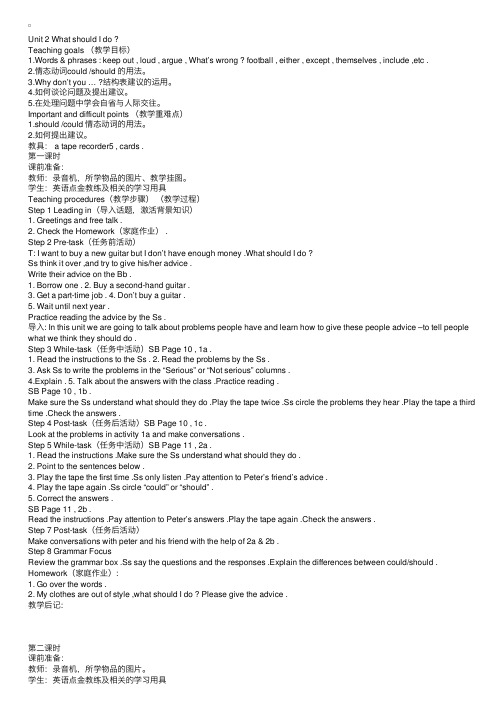
Unit 2 What should I do ?Teaching goals (教学⽬标)1.Words & phrases : keep out , loud , argue , What’s wrong ? football , either , except , themselves , include ,etc .2.情态动词could /should 的⽤法。
3.Why don’t you … ?结构表建议的运⽤。
4.如何谈论问题及提出建议。
5.在处理问题中学会⾃省与⼈际交往。
Important and difficult points (教学重难点)1.should /could 情态动词的⽤法。
2.如何提出建议。
教具: a tape recorder5 , cards .第⼀课时课前准备:教师:录⾳机,所学物品的图⽚、教学挂图。
学⽣:英语点⾦教练及相关的学习⽤具Teaching procedures(教学步骤)(教学过程)Step 1 Leading in(导⼊话题,激活背景知识)1. Greetings and free talk .2. Check the Homework(家庭作业) .Step 2 Pre-task(任务前活动)T: I want to buy a new guitar but I don’t have enough money .What should I do ?Ss think it over ,and try to give his/her advice .Write their advice on the Bb .1. Borrow one .2. Buy a second-hand guitar .3. Get a part-time job .4. Don’t buy a guitar .5. Wait until next year .Practice reading the advice by the Ss .导⼊: In this unit we are going to talk about problems people have and learn how to give these people advice –to tell people what we think they should do .Step 3 While-task(任务中活动)SB Page 10 , 1a .1. Read the instructions to the Ss .2. Read the problems by the Ss .3. Ask Ss to write the problems in the “Serious” or “Not serious” columns .4.Explain .5. Talk about the answers with the class .Practice reading .SB Page 10 , 1b .Make sure the Ss understand what should they do .Play the tape twice .Ss circle the problems they hear .Play the tape a third time .Check the answers .Step 4 Post-task(任务后活动)SB Page 10 , 1c .Look at the problems in activity 1a and make conversations .Step 5 While-task(任务中活动)SB Page 11 , 2a .1. Read the instructions .Make sure the Ss understand what should they do .2. Point to the sentences below .3. Play the tape the first time .Ss only listen .Pay attention to Peter’s friend’s advice .4. Play the tape again .Ss circle “could” or “should” .5. Correct the answers .SB Page 11 , 2b .Read the instructions .Pay attention to Peter’s answers .Play the tape again .Check the answers .Step 7 Post-task(任务后活动)Make conversations with peter and his friend with the help of 2a & 2b .Step 8 Grammar FocusReview the grammar box .Ss say the questions and the responses .Explain the differences between could/should . Homework(家庭作业):1. Go over the words .2. My clothes are out of style ,what should I do ? Please give the advice .教学后记:第⼆课时课前准备:教师:录⾳机,所学物品的图⽚。
新课标人教版八年级英语下册Unit 2 What should I do(1)

Unit 2 What should I do(1)单元教材分析学会should ,Why don’t you和could在英语中的习惯用法。
使用这些习惯用法,就自己生活、学习中存在的某些实际问题提出建议;拒绝、接受别人的建议。
在学习贴近学生生活实际的语言知识的同时,特别关注学生生活和学习中的真实困难和烦恼。
进一步引导学生对自我和周围世界进行比较客观的认识、评价,发展学生主动解决问题的自我意识和行为能力。
发展学生与人和谐交往的能力;培养在学生交流中寻求帮助。
既坚持自己观点、又听取别人建议。
单元总体目标1. The students will learn to talk about problems.2. The students can help people in trouble and how to give advice.3. Practice the sentences with “could, couldn’t, shouldn’t”.4. To learn the words and expressions about reading passage.单元重难点一览单元学情分析In this unit students learn to talk about problems and give advice. First make up a problem you might be having and write you could do about it. Secondly read the problem to the class again and help the class give advice using the words could, should, shouldn’t. In the end, make sentences with the words and write some letters or make conversations.单元教学建议Ask the students to read papers or magazines to find some problems the people have, then ask the students to make a chart with each problem. Ask some students to write a paragraph about the worst advice they ever got, and guess what the problem is. Maybe ask three or five students to work in group for a radio talk show where people call in for advice.单元课时分配Five periods第一课时教学内容1. To learn the words and expressions about this period.2.To talk about the problems serious or not for them in daily life.3.To learn how to describe the problems you have or how to help others to give him orher some advice.教学目标知识与能力1. Knowledge aims: Words and expressions; How to use should, could, shouldn’t;2. Ability aims: Express the good ideas to solve the problems;Help others when they are in trouble.过程与方法首先谈论生活中严肃或不严肃的事情;通过听力训练和口语表达学会如何表达自己的困难,如何给别人提建议等;通过谈论表达自己对有些困难的理解,提出个人不同的建议。
Unit 2 What should I do第一课时语法归纳
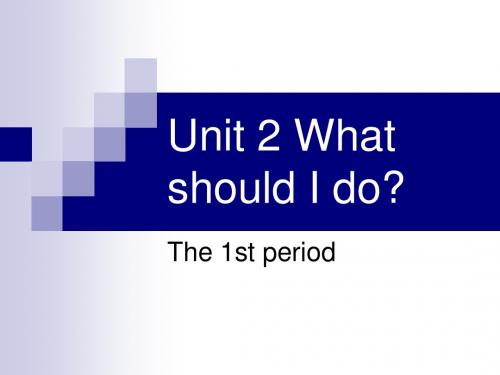
The 1st period
给建议的句型总结: 给建议的句型总结:
How about…? / What about…? Why don’t you do sth.? = Why not do sth.? (为什么不……?) You could …. You should… You’d better (not) do sth. (你最好做……/ 你最好不做……) You need to…
表达不同意他人所给建议句型总结
No, I don’t think so. I’m afraid not. I don’t agree. I disagree.
Keep 用法总结: 用法总结: keep out 不让……进入 keep + adj. 保持……状态 keep in good health= keep healthy keep fit 保持健康 keep a pet 养宠物 keep doing sth 让……一直做某事直
Loud 和aloud的区别: 的区别: Loud 指高声的,声音大传得远, 指高声的,声音大传得远, 有吵闹的意思, 有吵闹的意思,在口语中可以 代替loudly。 代替loudly。 Aloud指的是出声的,不是在心 里默默地说。 Read aloud 朗读
enough+n. Adj./ adv. + enough enough to do sth.
表达同意别人所给建议句型总结: 表达同意别人所给建议句型总结:
Yes, I think so. Certainly/ Sure / Of course. All right. / OK. That’s a good idea. That sounds good. That’s true. I agree with you.
unit2_what_should_i_do?教案

Step ⅠGreetingGreet the class as usual and check the homework. Step ⅡSection AShow a chart on the screen.ProblemI want to buy a new guitar but I don’t have enough money. Advice1. Wait until next year.2. Don’t buy a guitar.3. Borrow one.4. Buy a used guitar.5. Get a part-time job.And tell students what my problem is. Ask students to give advice.Tell students in this unit we’re going to talk about problems people have and learn how to give these people advice—to tell people what we think they should do.Step ⅢShow the new words on the screen. Read the new words and ask students to repeat.keep out; serious; stereo; loud; argue; out of style Step Ⅳ1aNow please open your books at Page 10.Look at activity 1a please.Point to the problems and ask five students to read the problems to the class.S a: My parents want me to stay at home every night.S b: My brother plays his stereo too loud.S c: I don’t have enough money.S d: I argued with my best friend.S e: My clothes are out of style.Read each sentence again and ask students to repeat it.Ask students to explain in their own words what eachsentence means. They can point to parts of the picture,use actions, simple drawings on the board and simplesentences.Then point out the headings in the box to the class. Tellstudents serious problem is a very bad problem, a verybig problem.Ask students to write the problems in the Serious orNot serious columns.Now talk about the answers with the class.Step Ⅴ1bIn this activity first ask different students to say whatthey see in each picture.Then ask students to listen to the conversation. In thechart circle the problems that they hear the girls talkingabout.Play the recording for the first time. Students onlylisten. And then play it a second time. This time studentscircle the problems they hear.Correct the answers.Step Ⅵ1c PairworkFirst ask two students to read the sample dialogue.Then say, Make conversations like this about theproblems in activity 1a.As students talk, move around the classroom checkingtheir work. Offer language support as needed.In the end ask several pairs of students to say theirconversations to the class.Give them little presents if they do their work well.Step ⅦSummaryThis class we’ve learned some key vocabulary. Andwe’ve learnt how to give somebody advice if he or shehas some problems. If you are interested in joining allkinds of activities in class, you’ll make great progress.Step ⅧHomeworkPlease ask your parents or friends what problems theyhave in order to see if you can give them some goodadvice.2listen to the recording this time, ask students to writePeter’s problem on the blank lines in activity 2a.Then check the answers.Answers: I argued with my best friend.Step Ⅳ2bFirst read the instructions. Show students the examplematch.You could write him a letter. I don’t like writing letters.Ask students to listen again and draw lines to match theadvice and the reasons. Like the sample match.Then play the recording again.Check the answers.Answers: 1.d 2.e 3.a 4.c 5.bStep Ⅴ2c Group workThis activity demands students to role play theconversation between Peter and his friend.First tell students how to do this activity.Point to the example in the sample dialogue. Ask twostudents to read the conversation to the class.Point out the sentences in activity 2b.Ask two studentsto role play a conversation between Peter and his friendusing these two sets of sentences.Then have student work in pairs. First one student isPeter and the other student is Peter’s friend.Then thetwo students change places.At the end check the answers by calling on differentpairs to say a conversation to the class. Praise them fortheir good job.Step ⅥGrammar FocusReview the grammar box. Ask students to say thequestions and the responses.Point out that the word should is always used to ask foradvice, but the words could, should, and shouldn’t areused to give advice.Step ⅦSummary and HomeworkThis class we listened to a conversation and knewabout Peter’s problem and the advice his friend gavehim. And we’ve learnt the three words:could, should,shouldn’t. The three words are used to give advice.After class you can have more practice using the threewords to give some advice.4students write “good idea” “okay idea” or “bad idea”next to each suggestion. Ask them to do the activity ontheir own.Then talk about the students’ answers.Read the firstpiece of advice and ask students to raise their hands ifthey think it is a good idea. Then ask students who thinkthis advice is an okay idea to raise their hands. And thenask students who think it is a bad idea to raise theirhands. Write the scores on the board.Repeat for the other pieces of advice.Step Ⅳ3b PairworkFrist point out the example conversation and ask twostudents to read it to the class.Sa: I need some money to buy gifts for my family. Whatshould I do?Sb: I think you should borrow some money from yourfriends.Sa: Oh, no. I don’t like t o do that.Sb: Then I think you should get a part-time job.Sa: That’s a good idea.Ask students to say some ways to get money that aren’tin the book. Write these on the board and explain theseways to the class. Have students work with theirpartners as they ask for and give advice.In the end ask two or three pairs of students to say theirconversations to the class.Step Ⅴ4 PairworkFirst ask students to look at the picture. Say, This isJim. He is a Canadian boy who has come to live inChina with his parents. He wants to practice hisPutonghua, but he is very shy. Make a list of things Jimcould do.Ask students to complete the work in pairs.Ask a few students to list their advice. Write a list ofthe best advice on the board.Step ⅧSummaryToday we’ve learnt how to give somebody advice.Ihope you can learn to communicate with others and helpsomebody if he or she has some trouble.Step ⅨHomeworkPreview the next page.Finish off the workbook exercises.6810activities.2.Many children are under pressure.3.Parents these days push their children much harder than before.petition between families starts at a young age.5.Children should have free time to relax. Then ask students whether the situation is the same in China. Have them discuss with their partners.3bAsk students write four sentences using one of the words from 1b in each sentence.And invite four students write their sentences on the board.3cIf you are Dr Alice Green. Write a letter to Cathy Taylor. Give advice about what she should do with her children.Step ⅤSection 4 Go for it!4aPressure is a serious problem in today’s world.We should find ways to relax.Are you or your friends under pressure?Do a survey to find out.Show the questions on the screen and ask students to do their surveys.Questions1. When do you feel under pressure?2. What should you do to relax?4bIf there is someone in your class who has a big problem, make a plan to help them.Step ⅥIf you have time!If time permits, role-play interviews between a “psychologist” and a person who is under pressure. Step ⅦSummaryThis class we’ve learned a reading passage.And we knew many families and children are under pressure. We should learn how to work and how to relax. If you have any problems, you should solve them as soon as possible. I wish all of you can have a very happy life. Step ⅧHomeworkPreview the next unit.。
- 1、下载文档前请自行甄别文档内容的完整性,平台不提供额外的编辑、内容补充、找答案等附加服务。
- 2、"仅部分预览"的文档,不可在线预览部分如存在完整性等问题,可反馈申请退款(可完整预览的文档不适用该条件!)。
- 3、如文档侵犯您的权益,请联系客服反馈,我们会尽快为您处理(人工客服工作时间:9:00-18:30)。
Unit 2 what should I do?
Maybe you should learn to relax.
Life for Cathy’s three children is very busy. Their school days are busy enough. After school, though, Cathy takes the two boys from football to basketball. Then she has to take her daughter to piano lessons. The tired children don’t get home until 7 pm. They have a quick supper, and it’s time for homework. They are like many American and British parents. They take their children from activity to activity, and try to fit as much as possible into their kids’lives. Doctors say many children are under too much pressure. Teachers complain about teaching tired 也许你应该学会放松
对于Cathy的三个孩子的生活是非常的忙,他们的学校日是足够的忙,下学后
Cathy带两个男孩从足球课到篮球课
然后她不得不带女儿去上钢琴课
疲惫的孩子不会回到家直到7点
他们吃顿简单的晚餐,并且该写作业了
他们像许多美国人和英国人的父母
他们带他们的孩子从一个活动到一个活动
尽量尽可能多的在孩子的生活中
医生说许多孩子在太多的压力下
教师抱怨关于教疲惫的
kids in the classroom.
Most children take part in after-school clubs. Activities include sports, language learning, music, and math classes. Pushy parents are nothing new, but now parents seem to push their children a lot more. Parents see other children doing a lot of things, and they feel their own children should do the same. Linda , a mother of three in London, knows all about such pressure. “in some families, competition starts from a very young age,”she says. “mothers send their kids to all kinds of classes when they are very young. And they are always comparing them with
孩子在教室里大多数的孩子参加校外俱乐部
活动包括运动,语言学习,音乐
和数学课,固执的父母没有新意,
但是父母似乎督促的孩子更多,
父母看到其他的孩子做许多的事情,
并且他们感到他们自己的孩子应该做的一样
Linda,一个三个孩子的妈妈,知道所有的压力
在一些家庭,竞争开始
从很小的年龄,她说,妈妈送
他们的孩子去各种课程当他们是
非常小,并且他们总是比较他们和其他的孩子
other children. It’s crazy. People shouldn’t push their
kids so hard.”
Dr Alice agrees. She also says that these children may find it hard to think for themselves when they are older. “parents are trying to plan their kids’ lives for them. When these kids are adults, they might find it difficult to plan things for themselves.”Parents should learn to give their kids a bit more time to themselves. on the one hand, children need organized activities. On the other hand, they also need time and freedom to relax, and they need time to do things by themselves.
这样很疯狂,人们不应该这样的督促他们的孩子Dr Alice同意,他也说,这些孩子
可能发现它很难去思考他们自己当他们
长大后,父母正试图计划孩子的生活为他们当这些孩子成人后,他们可能
发现很难计划事情为自己
父母应该学会把更多的时间该他们
一方面,孩子们需要
有组织的活动,另一方面,他们也
需要时间和自由去放松,他们需要时间
去做事情靠他们自己。
